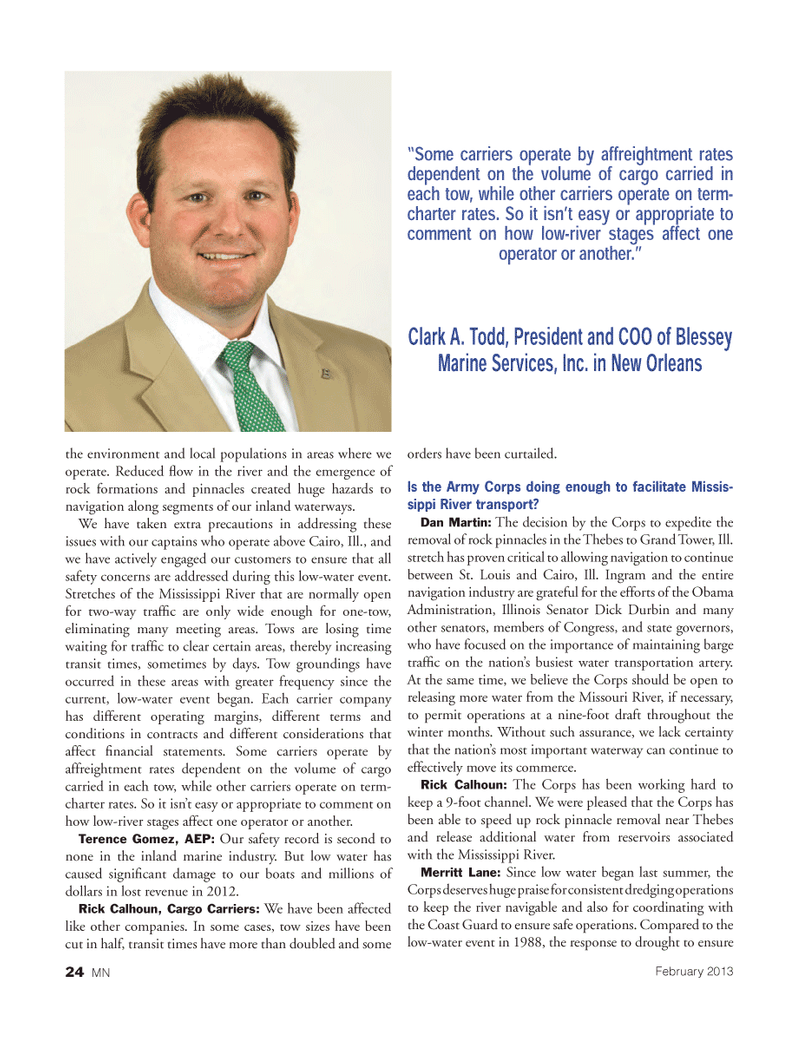
Page 24: of Marine News Magazine (February 2013)
Bulk Transport Leadership Roundtable
Read this page in Pdf, Flash or Html5 edition of February 2013 Marine News Magazine
the environment and local populations in areas where we operate. Reduced ß ow in the river and the emergence of rock formations and pinnacles created huge hazards to navigation along segments of our inland waterways. We have taken extra precautions in addressing these issues with our captains who operate above Cairo, Ill., and we have actively engaged our customers to ensure that all safety concerns are addressed during this low-water event. Stretches of the Mississippi River that are normally open for two-way trafÞ c are only wide enough for one-tow, eliminating many meeting areas. Tows are losing time waiting for trafÞ c to clear certain areas, thereby increasing transit times, sometimes by days. Tow groundings have occurred in these areas with greater frequency since the current, low-water event began. Each carrier company has different operating margins, different terms and conditions in contracts and different considerations that affect Þ nancial statements. Some carriers operate by affreightment rates dependent on the volume of cargo carried in each tow, while other carriers operate on term- charter rates. So it isnÕt easy or appropriate to comment on how low-river stages affect one operator or another. Terence Gomez, AEP: Our safety record is second to none in the inland marine industry. But low water has caused signiÞ cant damage to our boats and millions of dollars in lost revenue in 2012. Rick Calhoun, Cargo Carriers: We have been affected like other companies. In some cases, tow sizes have been cut in half, transit times have more than doubled and some orders have been curtailed. Is the Army Corps doing enough to facilitate Missis-sippi River transport? Dan Martin: The decision by the Corps to expedite the removal of rock pinnacles in the Thebes to Grand Tower, Ill. stretch has proven critical to allowing navigation to continue between St. Louis and Cairo, Ill. Ingram and the entire navigation industry are grateful for the efforts of the Obama Administration, Illinois Senator Dick Durbin and many other senators, members of Congress, and state governors, who have focused on the importance of maintaining barge trafÞ c on the nationÕs busiest water transportation artery. At the same time, we believe the Corps should be open to releasing more water from the Missouri River, if necessary, to permit operations at a nine-foot draft throughout the winter months. Without such assurance, we lack certainty that the nationÕs most important waterway can continue to effectively move its commerce. Rick Calhoun: The Corps has been working hard to keep a 9-foot channel. We were pleased that the Corps has been able to speed up rock pinnacle removal near Thebes and release additional water from reservoirs associated with the Mississippi River. Merritt Lane: Since low water began last summer, the Corps deserves huge praise for consistent dredging operations to keep the river navigable and also for coordinating with the Coast Guard to ensure safe operations. Compared to the low-water event in 1988, the response to drought to ensure ?Some carriers operate by affreightment rates dependent on the volume of cargo carried in each tow, while other carriers operate on term- charter rates. So it isn?t easy or appropriate to comment on how low-river stages affect one operator or another.? Clark A. Todd, President and COO of Blessey Marine Services, Inc. in New Orleans24 MNFebruary 2013 MN Feb2013 Layout 18-31.indd 24MN Feb2013 Layout 18-31.indd 241/30/2013 4:48:53 PM1/30/2013 4:48:53 PM

 23
23

 25
25
